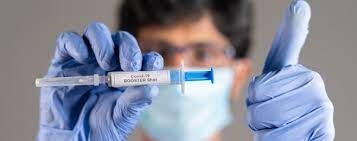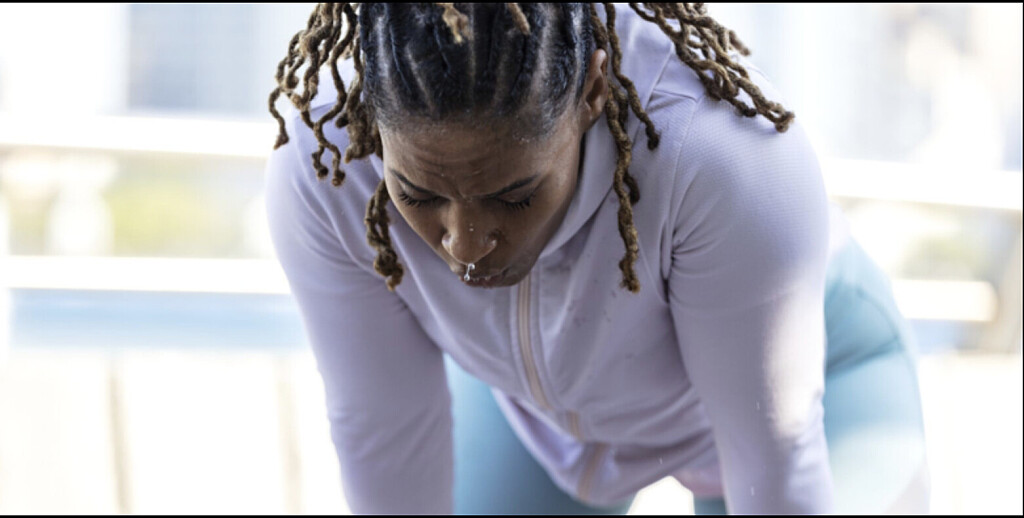Running News Daily
Running News Daily is edited by Bob Anderson. Send your news items to bob@mybestruns.com Advertising opportunities available. Train the Kenyan Way at KATA Kenya and Portugal owned and operated by Bob Anderson. Be sure to catch our movie A Long Run the movie KATA Running Camps and KATA Potato Farms - 31 now open in Kenya! https://kata.ke/
Index to Daily Posts · Sign Up For Updates · Run The World Feed
You Might Be Slower Soon After Getting a COVID Booster
New research finds a temporary decrease in a key aspect of fitness.
Everyone has that friend who got their COVID-19 vaccine and bounced back the next day, with little more than a sore arm. We’ve also heard (or told) stories of being in bed for multiple days after the first, second, third, and fourth shot.

While no one enjoys feeling unwell, runners have an added concern: How will a shot affect my upcoming training and racing?
A recent study offers some quantification to anecdotal evidence runners have been sharing for the past year and a half, where the new research found a small decline in aerobic capacity post-booster. Here’s how to incorporate that finding into your training plans.
Why Runners Care About VO2 Max
VO2max is often treated as the gold standard measurement of cardiovascular fitness. It represents the maximum amount of oxygen your body can use during exercise. This matters for runners because, all else equal, the more oxygen you can use, the harder you can work.
Given the significance of VO2 max to athletes, researchers in Belgium set out to test whether the COVID-19 booster affected it. They recruited 42 recreational endurance athletes (runners, cyclists, and swimmers) who were scheduled to receive their COVID booster—i.e., the third shot in the two-series Pfizer vaccine. Just before they got their shot, the athletes took a VO2 max test. This involved riding a stationary bike while wearing a device that measured oxygen consumption. As resistance on the bike went up, their oxygen consumption also went up until it eventually plateaued—indicating VO2max.
One week after receiving their booster, the athletes repeated the test. Compared to their performance pre-booster, their VO2max showed, on average, a 2.7 percent decrease.
Given that a decline in VO2 max reflects a decline in cardiovascular fitness, this finding is worth factoring into your training and racing plans. However, it’s worth noting that a 2.7 percent decrease in VO2 max does not necessarily mean a 2.7 percent decrease in speed. Here’s an example using Jack Daniels’s VDOT values (which are a proxy for VO2 max).
Let’s say a runner with a VDOT of 38 gets her COVID booster. This lowers her VO2 max (VDOT) by 2.7 percent, giving her a reduced VDOT value of 36.97. According to Daniels’s calculations, all else being equal, her previous 5K time of 25:12 would slow to about 25:45, or by 33 seconds—which is only 2.2 percent slower. If she’s fitter and has a half marathon time of 1:44:20 and a VDOT of 43? One week after the booster, her VDOT would be just below 42, and her half marathon time would increase from 1:44:20 to around 1:46:30, or by 2.1 percent.
VO2 Max Isn’t Everything
Admittedly, these calculations assume “all else being equal,” which is virtually impossible. Many other factors contribute to running performance, including running economy (how much oxygen you need to run a given pace), stride mechanics, and even perceived effort. Hielko Miljoen, a sports cardiologist at University of Antwerp and lead author on the paper, pointed out that in that respect, this study is only the beginning of an answer to how the booster affects performance.
“The next step in this investigation should be to do an endurance test, because VO2max is just one part of exercise capacity and athlete performance,” he says.
Additionally, the researchers only tested VO2 max one week out from the booster shot. While it’s unknown what effects may exist further out from the shot—the researchers did not retest the athletes at later intervals—it seems unlikely that the decline is permanent. “This study is by no means an answer,” says Miljoen. “It is trying to reassure people that the effects are not huge, probably not lasting.”
Weigh the Risks
Every medical decision is a personal one, and the reality is that getting the COVID-19 vaccine, including the booster, doesn’t come with a non-zero amount of risk.
“The entire field of medicine comes with statistics,” says Miljoen. “The benefit and harm of a certain medical procedure or intervention are only known on a population basis, so individuals must make up their own mind based on the data out there.”
While life-threatening risks of the vaccine are low, getting it or the booster may interrupt your training for a few days. A recent study of more than 1,000 elite Polish athletes found that the athletes lost an average of two and a half training days around getting the COVID vaccine. However, the same study found that athletes lost an average of eight training days due to COVID-19 infection. Given these and other research data, the authors concluded in favor of vaccination for athletes, writing that “the benefit–loss ratio strongly favors vaccination.”
Time Your Shot Strategically
While it doesn’t feel great to miss any amount of training, one advantage of vaccination and booster shots is that they can be timed to have minimal impact on a racing season—whereas COVID infection can’t.
Ben Rosario, executive director of Hoka NAZ Elite, recalls two of his athletes contracting what he believes was COVID in January 2020.
“I think it really affected them in the 2020 Olympic Trials marathon, because it was a real detriment to their training at that time,” he says. “They missed a really important 10 or so days of training.”
With the initial vaccines, he observed that athletes would feel unwell for seven to 10 days; consequently, they tried not to schedule their vaccination in the week or two leading up to a race. The results of the Belgian study suggest that similar scheduling may be warranted for the booster. While you may only feel the effects of the booster for a day or two, its less discernable effects—like suppressed VO2 max—can still affect your race if you schedule it too close to the shot.
Go Light Around Your Booster
Amy Yoder Begley, coach of the Atlanta Track Club, says that what her team found worked best was to ease off training for the few days surrounding their booster. Typically, the athletes would do a light day of training on the day of the booster and then go home, hydrate, and focus on moving their arm throughout the rest of the day. They’d take the next day off to let their body recover and then, depending how they felt, they’d slowly ease back into training.
“I just kept telling people: literally you’re talking two to five days to let the body do its thing to give you more protection down the road, if possible,” says Begley.
Rosario has a similar message: “My advice to all runners would be to be patient. What’s the harm in missing some training if you’re going to come back super healthy?”
by Runner’s World
Login to leave a comment




